As agencies locked their doors and oversight sites went dark, Taxpayers for Common Sense marked three decades of keeping the lights on for taxpayers. Wednesday night at Eastern Market wasn’t a gala or a victory lap—it was a reminder that real watchdogs don’t retire.
Keith Ashdown never set out to be famous. He just hated waste. The 2025 Mr. Smith Goes to Washington Award went to him—a fiscal sleuth who made a career out of sniffing through the fine print until the truth leaked out.
In the late ’90s, Keith walked into TCS as Communications Director and started reading every line of the federal budget. Somewhere between the acronyms and appropriations, he found the absurd. A $233 million bridge to an island of fifty people. The Gravina Access Project. He gave it different name—the Bridge to Nowhere—and Washington’s spending culture has been haunted by it ever since.
Then came the “Duke” Cunningham scandal, a bribery ring built on taxpayer-funded earmarks. Keith teamed up with the reporters at the San Diego Union-Tribune, followed the paper trail, and helped crack open one of Congress’s dirtiest secrets. It wasn’t glamorous work—it was spreadsheets and subpoenas—but it changed how Washington talks about waste.
After TCS, Keith took that same stubborn streak to Capitol Hill, helping Senator Coburn (R-OK) dig through contracting fraud and agency excess. He’s spent his career proving one thing: when government forgets who it works for, someone has to remind it.
When award-winning investigative reporter Tom Hamburger took the stage to hand him the award—his old investigative partner turned friend—the room knew what it was seeing: two watchdogs who never stopped barking.
A founder and a builder
Then came Ryan Alexander. If Keith is a hunter, Ryan’s a builder—the one who made watchdogging an institution. She ran TCS for more than a decade, turning it from a scrappy outfit into the go-to voice on federal spending. Her secret was simple: do the homework, show your work, and never let anyone call you partisan.
When TCS published its massive earmark databases, Ryan insisted every line, source, and method be public. “We weren’t reinventing the wheel,” she said in our Budget Watchdog AF (All Federal) podcast. “We were just reading what was already there. The absurdity speaks for itself.”
Under her leadership, TCS didn’t shout. We didn’t grandstand. We just got it right. That’s why members of Congress—from the Freedom Caucus to the Progressive Caucus—kept calling. Not because they agreed with us, but because they trusted our math.
She also made the abstract human. A $3 billion subsidy isn’t just a line item; it’s a question of fairness. Who pays, who benefits, and who’s watching? That’s what Ryan asked, over and over.
Ryan turned down big checks that came with political strings. She kept TCS stubbornly independent. That’s why she’s now in the Taxpayer Hall of Fame—not for being agreeable, but for being right.
Jill Lancelot, who co-founded TCS in 1995, presented the award. Back then, she and Rafael DeGennaro saw a city overflowing with lobbyists but not a watchdog standing guard for taxpayers. So they built one.
Jill called TCS “the missing element in the policy landscape.” She meant that someone had to connect the dots between fiscal conservatives, environmental advocates, and anyone else who thought common sense shouldn’t depend on party lines.
That’s how TCS helped kill billion-dollar boondoggles—like the Auburn Dam and the Bridge to Nowhere. Unlikely allies, shared facts, relentless persistence. It worked.
Why watchdogs endure
People think watchdogs are cynics. We’re not. The good ones are idealists with sharp teeth. “We have a right and a duty as taxpayers to demand excellence from government,” Ryan said. “For democracy to work, we need to know what it’s doing.”
That belief—that knowledge is power and waste is optional—has carried TCS through three decades. From Jill’s first Budget for the Living Dead to Ryan’s transparency crusades to Keith’s headline-making investigations, every generation of watchdogs has chased the same goal: a government that respects the people who fund it.
Thirty years later, the numbers are bigger, the games more complex, but the mission hasn’t changed. We’re still watching. Still calling it out. Still proving that common sense can, in fact, make a difference.
The watchdog’s still on duty—and we’re not done yet.








